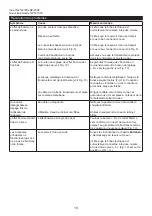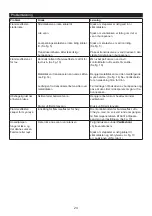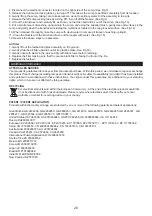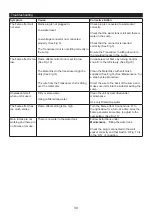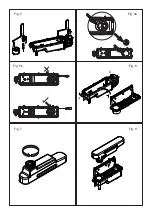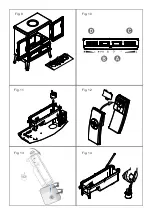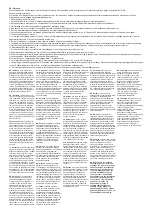
Installation Instructions
This section describes how to set up your fi re.
Before installing this appliance in an existing chimney, we recommend that;
1. You have your chimney cleaned by a competent chimney sweep.
2. You block off the chimney fl ue.
This procedure is important for the effi cient operation of the heating unit and will also reduce heat loss up the chimney.
BEFORE YOU START
1. Ensure that all packing items are removed (read any warning labels carefully) and retain all packing for possible future
use e.g. in the event of moving house or returning the appliance to your supplier.
2. Before connecting the stove, check that the supply voltage is the same as that stated on the heater.
INSTALLATION
Place the stove against a wall and connect the stove to your electricity supply.
Connect the power cable to the appropriate power connector at the back of the fi re
Plug the power cable into a 13amp/240volt outlet. Do not yet switch the appliance on.
Connecting the Transducer Unit + Lamps
1. Release the two red tabs by turning them by 90 degrees (see Fig 2)
2. Lift out the Sump Nozzle (Fig 3)
3. Insert lamps into lamp holders (Fig 4), carefully locating the pins into the holes (Fig 4a)
4. Push lamps fi rmly into place
5. Place the Transducer Unit into the sump and join the cable to the connector on the sump (Fig 5)
6. To ensure that the Transducer Unit is correctly placed in the sump, the tab on the Transducer Unit should be lined up
with the moulded recess in the sump (Fig 5a).
7. Ensure that the cable is not placed above the disc on the Transducer Unit (Fig 5b). To prevent the cable becoming
pinched between the nozzle and the sump, place the cable in the slot in the wall of the sump.
8. Replace the Sump Nozzle and secure it by turning the two red tabs by 90 degrees (Fig 6)
Filling the Water Tank
9. Place Water Tank in sink and remove cap (turn anti-clockwise to open) (Fig 7)
10. Fill Water Tank with
fi ltered tap water only
. This is necessary to prolong the life of the fl ame and smoke producing
unit. The water should be fi ltered through a conventional domestic water fi lter unit and the fi lter should be replaced
regularly. Distilled water must
not
be used.
11. Screw the cap back on –
do not overtighten
.
12. Place the Water Tank in the Sump, with the tank cap facing down and the fl at side of the tank facing outward (Fig 8)
Assembling the fi re
13. Place the Fuelbed on top of the Water Tank and Mist Nozzle (Fig 9)
26
General Information
Only use fi ltered water in this appliance.
This model is designed to be free standing and is normally positioned near a wall.
Always ensure that the appliance is sitting on a level surface.
To reduce heat loss and to prevent any chimney up draft affecting the operation of your inset fi re we recommend they
the chimney fl ue is sealed off.
Please note: Used in an environment where background noise is very low, it may be possible to hear a sound which is
related to the operation of the fl ame effect. This is normal and should not be a cause for concern.
If this product experiences a power surge for whatever reason the product may cut-out. This is a normal safety feature
and the product will resume operation after 30 seconds.
Once installed, never move this appliance or lay on its back, without draining the water from sump and water tank.
If you intend not using the appliance for longer than 2 weeks, drain the water from sump and water tank and dry the
sump.
The water tank, sump, sump lid, tank cap and air fi lters must be cleaned once every two weeks, particularly in hard
water areas.
The appliance should never be operated if the lamps are not working.
The lamps should be regularly inspected as described under ‘Maintenance’ and ‘Changing lamps’.
If condensation occurs on the inside doors, reduce the amount of smoke and fl ames produced using Control Knob ‘D’
(see section ‘Operating the Fire’) and leave the door slightly ajar
The sump and the water tank in this product are treated with a biocidal product, Silver Biocide. This conforms with the
latest relevant ISO standard
Summary of Contents for Stonebridge STB20
Page 2: ...NL 1 DE 7 FR 13 NO 19 GB 25...
Page 33: ...480 300 620 250 250 Fig 1 Fig 4 Fig 4a Fig 2 Fig 3...
Page 34: ...Fig 5 Fig 5a Fig 5b Fig 6 Fig 7 Fig 8...
Page 35: ...Fig 9 Fig 10 Fig 11 Fig 12 Fig 13 Fig 14...
Page 36: ...REMOTE CONTROL SENSOR 30 60 90 Fig 15 Fig 16 Fig 17...
Page 37: ......
Page 38: ......







